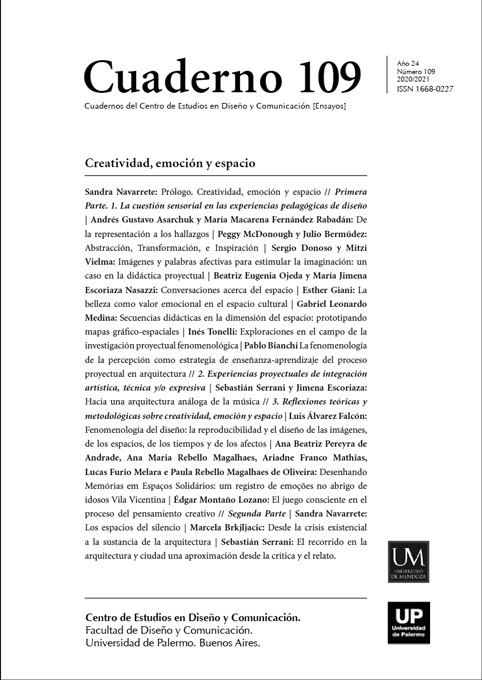Secuencias didácticas en la dimensión del espacio: prototipando mapas gráfico-espaciales
Abstract
The following document aims to present the design of a prototype spatial graphic map that will be tested within the framework of the graphic design careers of the UBA; We seek to be a contribution to the presentation of didactic sequences from the space dimension. Our proposal is close to that of a workshop where the student takes a leading role and relates to the space in an active, autonomous and different way. A free, open space, where activities happen that enrich the teaching processes. A “project laboratory”, a space that promotes, mobilizes and encourages experience. A workshop that calls and where the exchange is a fundamental part of the process; It is not a unilateral transmission of knowledge, but a joint development of experiences with shared objectives. In the words of Mariana Maggio Co-design the workshop spaces.
We think of open workshops where teachers, students, tools, and objectives talk to each other, accompany and enhance the workshop space like the one where it happens. Workshop spaces have to be reinvented from an overcoming look by building pedagogical vanguard (Mariana Maggio). We conceive the teacher as a guide, the students as complex but interesting individuals with all their qualities, emotions and multiplicity of ways of learning. The workshop as a blank canvas, capable of building from the objectives and / or stages proposed in each of the projects of the chairs. We have at our disposal a series of tools that run throughout the course of the course (diagnosis, monitoring, growth, motivation, definition, reflection, evaluation, observation, among others), which we do not always relate to the objectives of class. Our proposal seeks to account for all these elements and combine them in a useful graphic-spatial map as an accompaniment to the design of teaching sequences.
References
Bosch, R. (2018). Diseñar un mundo mejor empieza en la escuela. España: Rosan Bosch Studio.
Litwin, E. (2008). Las configuraciones didácticas. Una nueva agenda para la enseñanza superior. Buenos Aires: Paidós.
Maggio, M. (2018). Reinventar la clase en la Universidad. Buenos Aires: Paidós.
Maggio, M. (2012). Enriquecer la Enseñanza. Buenos Aires: Paidós.
Maggio, M. (2017). 50 innovaciones educativas para escuelas, CIPPEC. Buenos Aires.
Pinto, L. (2019). XIV Foro Latinoamericano de Educación Rediseñar la escuela para y con las habilidades del siglo XXI, Ciudad Autónoma de Buenos Aires: Santillana.
Piscitelli, A. (2017). Hackeo de las dimensiones escolares, pedagogía de las diferencias y tecnologías radicales.
Rivas, A. (2018). XII Foro Latinoamericano de Educación: cambio e innovación educativa: las cuestiones cruciales, Ciudad Autónoma de Buenos Aires: Santillana.
Salinas, J. (2012). La investigación ante los desafíos de los escenarios de aprendizaje futuros. RED. Revista de Educación a Distancia, 32.
Brillhart, J. (2018). In the Blink of a Mind, Prologue, https://medium.com/the-languageof-vr/in-the-blink-of-a-mind-prologue-7864c0474a29
Cátedra Yantorno (2018). Workshop Herramientas. Cobb, P.; Confrey, J.; diSessa, A.; Lehrer, R., y Schauble, L. (2013), Design experiments in educational research. Educational Researcher, 32(1), 9-13.
Edelson, D. C. (2002). Design research: What we learn when we engage in design. Journal of the Learning Sciences.
Plomp, T. (2010). Educational Design Research: An Introduction Ent Teed Plomp y Nienke Niemen (Ed), An Introduction to Educational Design Research Proceedings of the seminar conducted at the East China Normal University. Shanghai, PR China.
Reeves, T.; Herrington, J. y Oliver, R. (2005). Design research: A socially responsible approach to instructional technology research in higher education. Journal of Computing in Higher Education, 16(2), 97-116.
Van den Akker, J. y Plomp, T (1993). Development research in curriculum: Propositions and experiences. Paper presented at AERA meeting, April 12-16. Atlanta.
Wang, F. y Hannafin, M. J. (2005). Design-based research and technology- enhanced learning environments. Educational Technology Research and Development, 53(4), 5-23.
Los autores/as que publiquen en esta revista ceden los derechos de autor y de publicación a "Cuadernos del Centro de Estudios de Diseño y Comunicación", Aceptando el registro de su trabajo bajo una licencia de atribución de Creative Commons, que permite a terceros utilizar lo publicado siempre que de el crédito pertinente a los autores y a esta revista.


